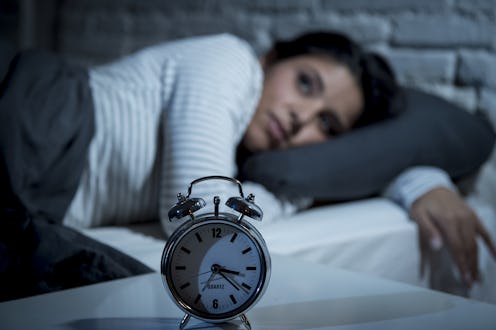Life
7 Surprising Things That Cause Nightmares
Experiencing nightmares often is not only stressful, but it can make you dread sleep. If you're someone who frequently experiences bad dreams, you'll likely do anything you can to make them stop so you can get some restful sleep. In addition to your stressors and worries, there are a number of surprising things that can cause nightmares, and knowing what these triggers are may be able to help you sleep more soundly at night.
"Nightmares occur as a result of physical and psychological conditions that are impacting sleep," psychologist Sweta Venkataramanan tells Bustle. "More often than not, anxiety is what is causing nightmares. When we experience a major life event such as the death of a loved one or a traumatic incident, we tend to work through these traumas in our sleep. This is a normal reaction to stress, but it can impair social and occupational functioning if it limits us from going back to sleep."
Nightmares can provide us some insight about our life, but they can also be very disturbing. Although you can't control everything that happens when you sleep, you can cut down on habits that make nightmares more likely. Here are seven surprising things that cause nightmares.
1Eating Before Bed
Eating before going to bed can increase the likelihood of bad dreams. "With your body working hard to break down the food, your brain is active — the precursor for nightmares," says Venkataramanan. Eating a large meal can trigger sleep disturbances such as night sweats or acid reflux, which could lead to increased recall of disturbing dreams, according to Harvard Health.
2Drinking Alcohol
Knocking back that glass of wine might help you fall asleep initially, but it can also cause some nightmares to creep in mid-sleep. "Alcohol consumption can also impact nightmares if you drink late at night," says Venkataramanan. "As you're sleeping, your body is metabolizing the alcohol and breaking it down — making your sleep more fragmented." This increases the likelihood that you have intense, colorful dreams and nightmares.
3An Irregular Sleep Schedule
If you're someone with an irregular sleep schedule or you commonly experience jet lag, you may be more prone to nightmares. "When you're not on a consistent sleep pattern, your circadian rhythm is thrown for a loop," says Venkataramanan. "As a result, your brain may be more active at night, setting the stage for nightmares to be more likely."
4Sleep Medications
You might want to check your medicine cabinet if you suffer from nightmares. "Some sleep medications, such as Ambien and Sonata, have been associated with an increase in nightmares," psychologist Dr. Laura Ciel, MA, PsyD tells Bustle. "This isn’t the case for everyone taking these medications, but it’s good to know in case you are already having sleep disturbances and you’re prescribed a medication that might be triggering more sleep problems."
5Sleeping On Your Back
Your sleep position can influence your dreams as well, with sleeping on your back causing more issues. "You might be more prone to airway disturbances which can lead to difficulty breathing," says Dr. Ciel. "If you’re in rapid eye movement (REM), this lack of air might trigger a nightmare where you’re drowning, chased, or suffocated."
6Too Much Sugar
A late-night dessert can also trigger some scary dreams. "Although research is not conclusive, there might be a connection between sugary or spicy foods and nightmares," says Dr. Ciel. "If you’re bothered by nightmares, take a look at what you’re eating in the last few hours before bed."
7Falling Asleep With The TV On
Falling asleep with the TV on is another common culprit when it comes to nightmares. "When the TV is on while you are sleeping, the language centers of the brain stay activated," psychotherapist Tina B. Tessina, PhD, LMFT tells Bustle. "This causes the brain to take in the information from the TV, and distort it to cause nightmares."
If you suffer from nightmares, try modifying these habits to see if it helps.
